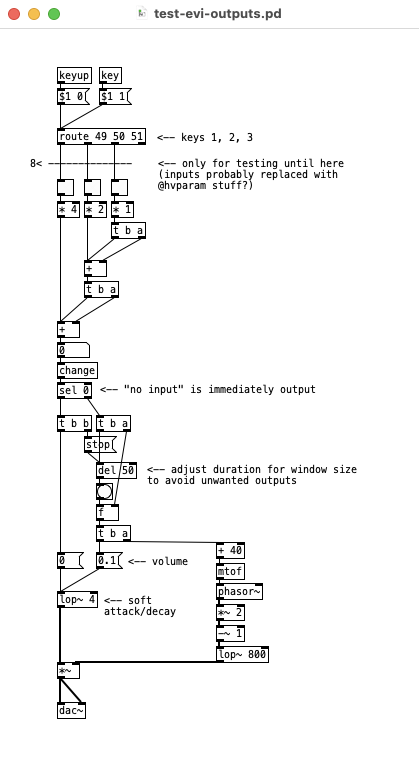-
 ben.wes
posted in technical issues • read more
ben.wes
posted in technical issues • read more@manuels said:
@ben.wes Oh, I think I completely missed your point ...

no worries. that was an interesting hint nonetheless!

disarm the switch after every crossing instead every switch
now i feel completely stupid, haha. of course that's the proper solution! there's no reason at all for not just resetting on every crossing!
i assume that i was too much influenced by a zero-crossing switcher abstraction i built in the past that required feedback in a similar case. thank you!
EDIT: and obviously, there's no need for the [sgn~] (sign) object. [>~ 0] is enough and i really hope that https://github.com/pure-data/pure-data/pull/2054 will make it into vanilla soon!
-
 ben.wes
posted in technical issues • read more
ben.wes
posted in technical issues • read more@manuels said:
@ben.wes You could use [cpole~] instead of [rpole~] like this: audio-rate-toggle.pd
thanks! - this seems very interesting! i never used [cpole~] so far and will play around a bit with it these days. but i admit that i don't get yet how i would use these states here to "disarm" the flipflop mechanism immediately after a switch?
-
 ben.wes
posted in technical issues • read more
ben.wes
posted in technical issues • read morethis should hopefully work correctly for switching only after impulses:
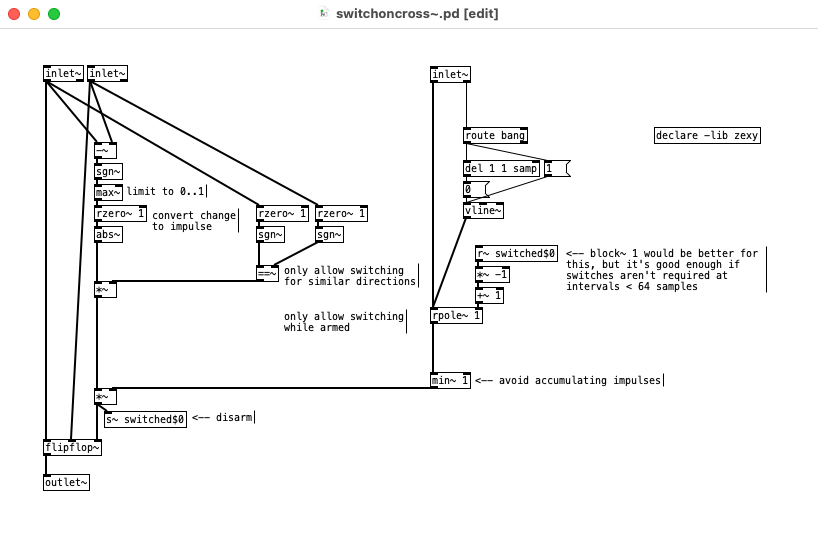
EDIT: without
block~ 1, there's a risk of directly switching back in the same block while the switch is still armed. so this is not very elegant. if anyone knows how to tackle this without 1 sample blocksize, let me know! -
 ben.wes
posted in technical issues • read more
ben.wes
posted in technical issues • read morea bit late to this and nice approaches were already mentioned. but since i just built a
flipflop~abstraction a few days ago, i felt like joining this discussion anyway.
here's a patch that uses this to switch signals when they're crossing while sharing the same direction:
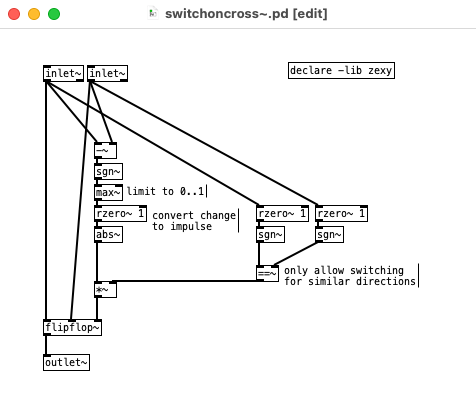
flipflop~is this: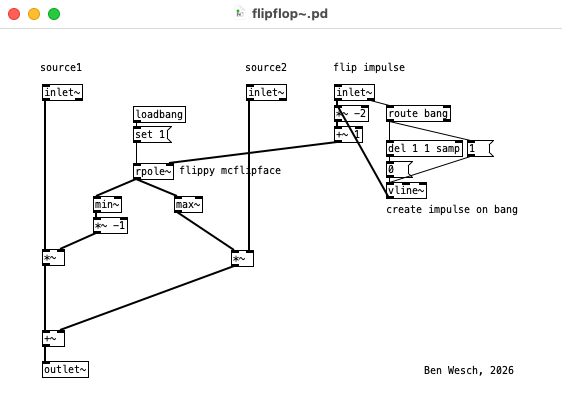
this obviously relies on the
zexylibrary. time to lobby for https://github.com/pure-data/pure-data/pull/2054 ... but these compiled objects can be replaced with vanilla stuff if needed.patches:
switchoncross~.pd
flipflop~.pdPS: this obviously happily switches the signals on every crossing. if you want to "arm" the switch through a trigger, it'll need to handle this additional "armed" state which then get's reset by the next crossing impulse ...
-
 ben.wes
posted in pixel# • read more
ben.wes
posted in pixel# • read morejust a short update for the record here - this is fixed with https://github.com/umlaeute/Gem/commit/6c321961440a99ec1e4515284a990286fcf5a041
(see issue for more details)
-
 ben.wes
posted in pixel# • read more
ben.wes
posted in pixel# • read more(sorry if someone already read about this issue on discord - should have posted here right away since the forum gathers quite a bit more experience ... in my experience.
 )
)i'm currently experimenting with some mechanisms to scan visuals for audio generation. it's quite fun - but for whatever reason, it seems like Gem is applying some kind of gamma correction when i load images via [pix_image]. i'm loading this image here, which should have a neutral grey in its center - rgb
(128, 128, 128)...
... but when i display it (or work with the values in shaders), the color at its center is read as
(109, 109, 109). does anyone know what the hell is going on there - and how i might avoid this?here's the texture processed by a shader that displays its distance to neutral grey - it's obviously far from the center:
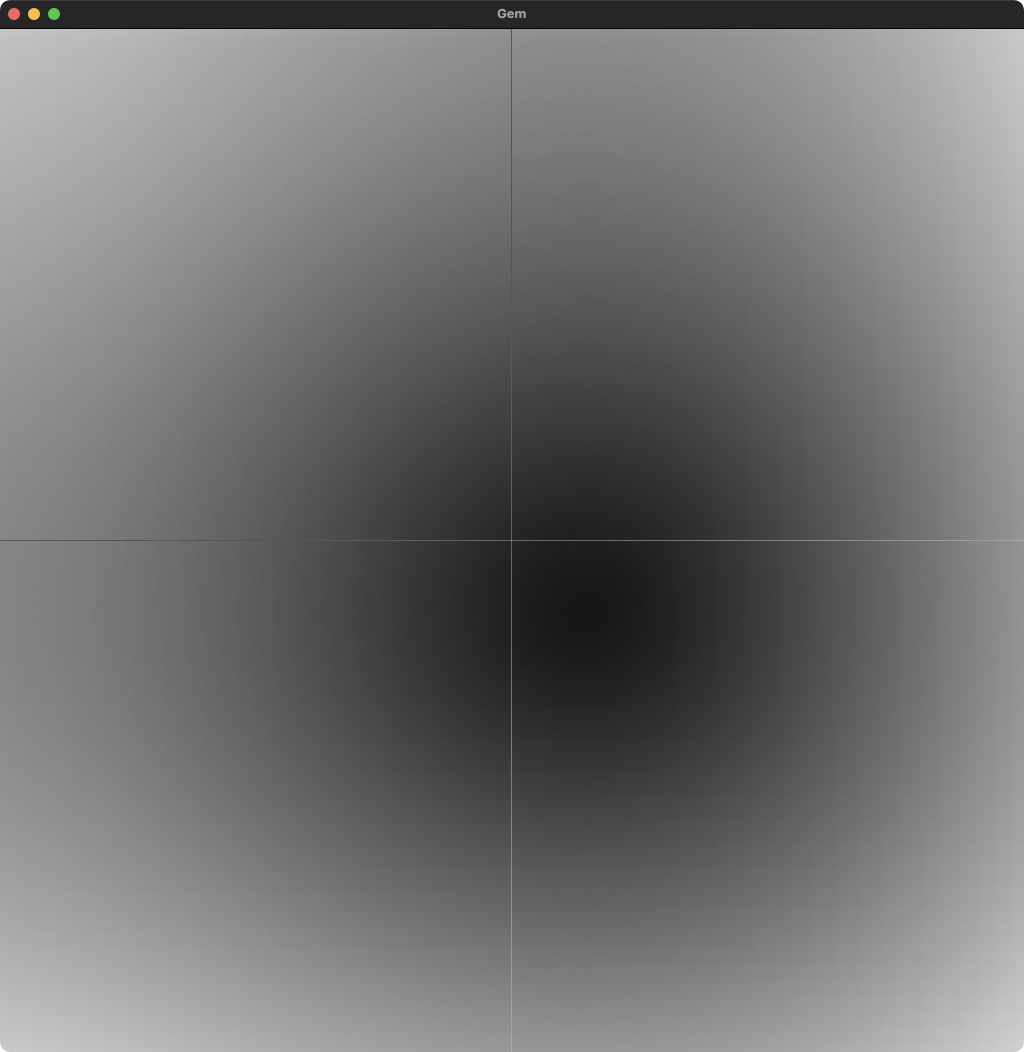
-
 ben.wes
posted in technical issues • read more
ben.wes
posted in technical issues • read morenot sure if i really got the idea - but based on the previous discussion and contributions, i came up with this patch to avoid unwanted output of intermediate states:
-
 ben.wes
posted in patch~ • read more
ben.wes
posted in patch~ • read morethis is rather experimental and also far from practicable (and certainly not what anyone is looking for when patching DSP stuff) - but since it came to my mind in this context, i'll leave it here anyway: with Gem, you can shift the oscillator computation to the GPU. there is an example for this in
examples/10.glsl/18.additive_audio_synthesis.pd. -
 ben.wes
posted in technical issues • read more
ben.wes
posted in technical issues • read more@jameslo said:
Woah! Look how similar my patch is and how little is missing:
haha, that really seems quite similar - and elegant.

actually,
cnv-help.pdexplains everything quite well! see thepd propertiesandpd positionsubpatches.
i slightly changed the color for the background cnv. so that's not completely coincidental, i admit.
-
 ben.wes
posted in technical issues • read more
ben.wes
posted in technical issues • read moremaybe it's not a bad idea to check out data structures again after they received some updates with the latest pd versions! - but in this case,
cnvobjects withelse/canvas.mouseseem to work reasonably well.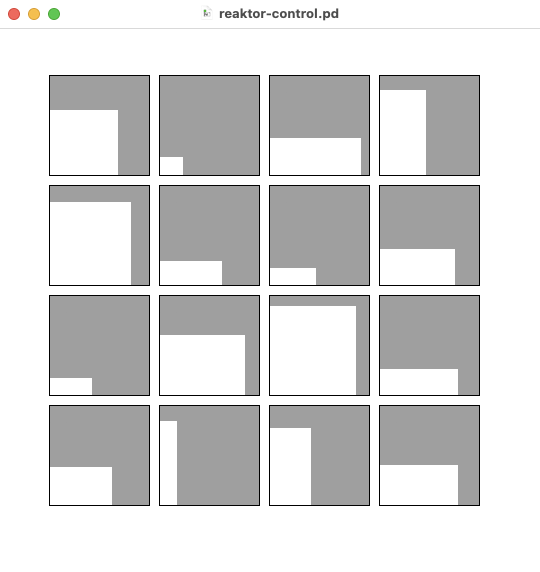
not sure this is the most elegant way - but it works:
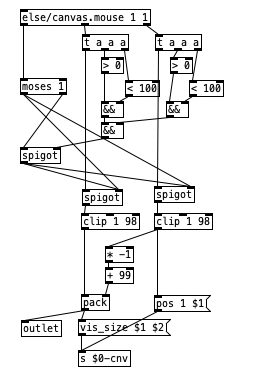
here's the patch: reaktor-control.zip

